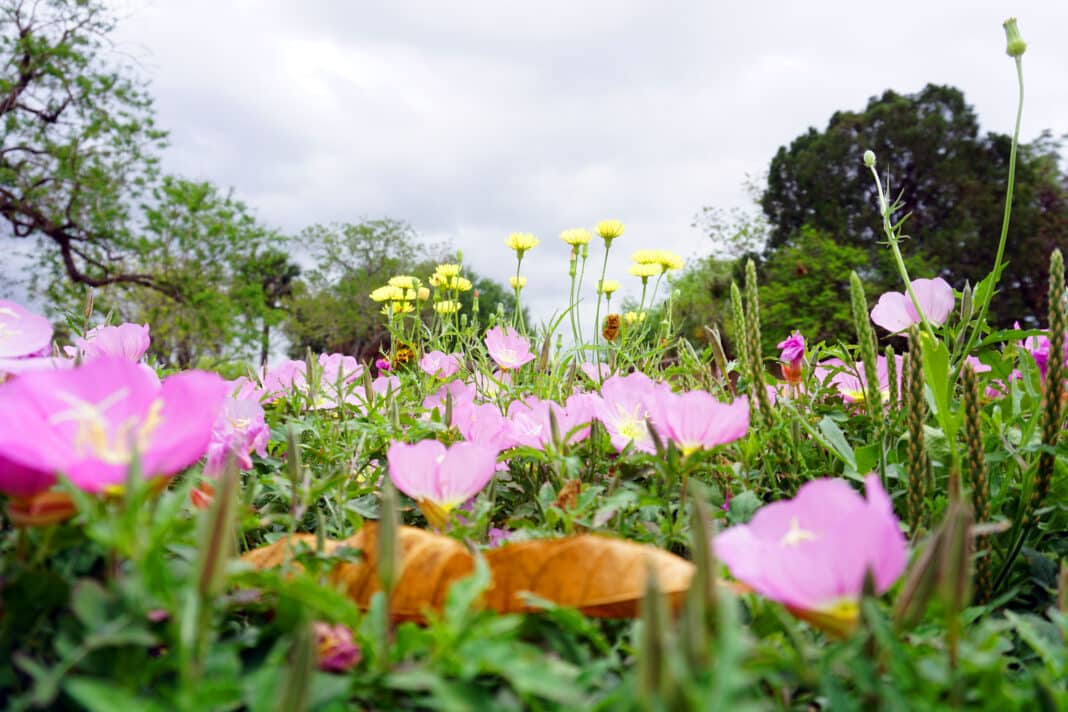Spectacularly dry, windy conditions and the February deep freeze are playing tug-of-war with the normal allergy season in the Rio Grande Valley, and it may take time to sort out who’s winning.
The Arctic weather of a month ago put a major dent in trees, shrubs, bushes and grasses just as they were about to spew their pollen into the Valley’s skies.
The question is, are the region’s plants working overtime to make up for the days they lost?
Dr. Maria Falcon is an allergy and immunology specialist in McAllen.
“A lot of patients are suffering,” she said Monday. “This is the time of the year when people suffer more because of the springtime, and it’s been so windy. The wind carries the pollen, but along with that there’s the dust and all the other irritants in the air. Usually, it’s the worst time for allergy sufferers.”
Falcon believes, like many experts, the deep freeze of February cut back on plant pollination and budding, but she’s afraid it’s merely a temporary respite.
“I think a little delay, a delay of the onset,” she said. “Because if you notice, everything died, but there’s a resurgence and all the trees are now back in bloom, so I think maybe it was a pause for a week or a week and a half.”
Like Falcon, Dr. William McKenna in Harlingen is also an allergy and immunology specialist. He cites the timing of the freeze as a unique factor this year.
“This year, this is kind of the difference. I’m going to tell you now versus every other year, we have never or at least since I’ve been here since ‘82 have we had a freeze this late in the season, being in the middle of February,” McKenna said Monday. “There were already trees and bushes and flowers blooming with new buds, and with the freeze they all died off. Now, I have noticed that all of these trees and bushes are blooming again.”
But, he added, “Yes, there are already people we’re seeing in the office who do have typical allergy symptoms flaring up.”
AccuWeather meteorologists, led by Senior Meteorologist Alan Reppert, released their annual spring allergy forecast earlier this month.
In the Southwest region, people with tree allergies may find their symptoms are not as severe as some years, with drought and higher temperatures tamping down tree pollen production, which is expected to remain low throughout the season, AccuWeather said.
“Anything that does grow will be pretty quick to die off due to drought,” Reppert said. “When the grass (and) weeds dry out and have no rainfall for some time, it will actually stunt the grass and weed growth and not allow it to really grow.”
As of last week, western Starr County was in exceptional drought conditions, the worst rating to have, according to the U.S. Drought Monitor. Nearly all of Hidalgo County, and western parts of Cameron and Willacy counties, are barely better in their extreme drought conditions.
In the rest of Cameron and Willacy, conditions range from severe drought to moderate drought right along the coast.
McKenna said due to the freeze and the drought, the triggers for seasonal allergy sufferers may be diminished. But those aren’t the only factor in play for those with respiratory problems, he said.
“On the negative side relative to allergy sufferers, we’ve got the wind,” he said. “And so not necessarily from an allergy standpoint but from a respiratory irritant standpoint, when the winds are high like today there’s a lot of dirt dust that is airborne.”
“That’s not an allergen, that’s inorganic,” he added. “There will be some pollens in the air, too, but the majority of particles that are going to be in the air when it’s windy like this, is going to be dirt dust that will aggravate anyone who has respiratory conditions regardless of whether they’re allergic or not.”
Curiously, the shutdowns, working from home and social distancing which accompanied the COVID-19 pandemic may have had beneficial health effects for some, Falcon said.
“I think the fact that not all people — I wish more people had heeded those instructions — but more people have stayed indoors, all the older people especially,” she said. “Children, because they did the remote learning or the virtual learning, they’re at home and they’re not around other kids so they haven’t been out as much as before.”
“In general, I will say that the children have not gotten sick as much during this pandemic, and the adults, too, we haven’t seen as much colds and flu,” she added. “But I don’t know if it’s worth it.”





